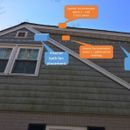Bath vent fan exhaust placement – under gable overhang or thru shallow pitched roof
Hi all,
Am seeking advice on vent fan exhaust placement for a second story bathroom in my 1950 Cape Cod (zone 4-A).
Based on Martin’s bath fan article (link below), I prefer a gable wall termination for many reasons. However, am concerned because a recent dormer expansion causes my roof to overhang the wall’s exterior slightly (~8-inch). The vent’s termination would be within a few inches of this overhang (see photo – please ignore the moldy/mildewy vinyl siding, unless you have ideas of what’s causing it!).
The roof presents another challenge in that it’s pitch on the dormer side is ~2/12. If I go this route, I plan on using something like this gooseneck vent cap and hope for minimal rain/snow infiltration:
https://m.lowes.com/pd/IMPERIAL-Aluminum-Roof-Vent-Kit/4598556
For either route, I plan on using 4-in flex duct for the first 1-2 ft, then rigid galvanized pipe for the rest of the run. I plan on wrapping all pipes with 2-in thick rock wool and angling pipes downhill where possible.
My question is – should I go thru the gable end and acknowledge that I’ll likely have dirt/mold/mildew above and around the vent termination, or go thru the roof and accept that water may leak down the vent pipe?
Many thanks in advance!
https://www.greenbuildingadvisor.com/blogs/dept/musings/bathroom-exhaust-fans
GBA Detail Library
A collection of one thousand construction details organized by climate and house part










Replies
Hankla.lzo, I would go through the cheek wall. The wall cap will be much better protected from stormwater and interior condensation. Your planned details sound good.
As for the siding, it looks like there is probably an overhanging tree on that side. I love trees, but the shade they cast is not good for houses. There may also be moisture leaking through from the interior, but that's probably not a big issue in zone 4. There are various solutions you can spray on the siding to clean it, some more toxic than others. (No siding, even vinyl, is really maintenance-free.)